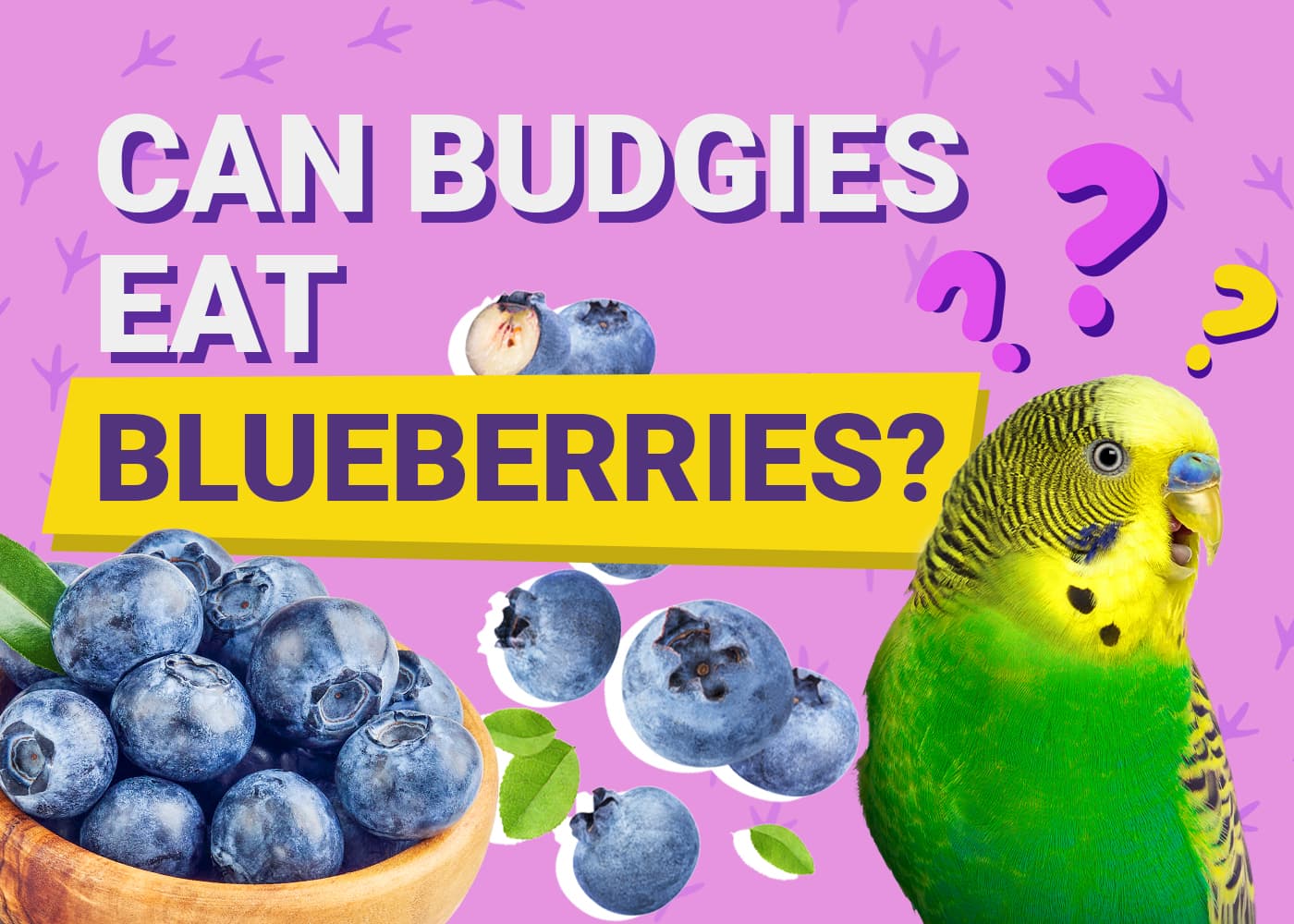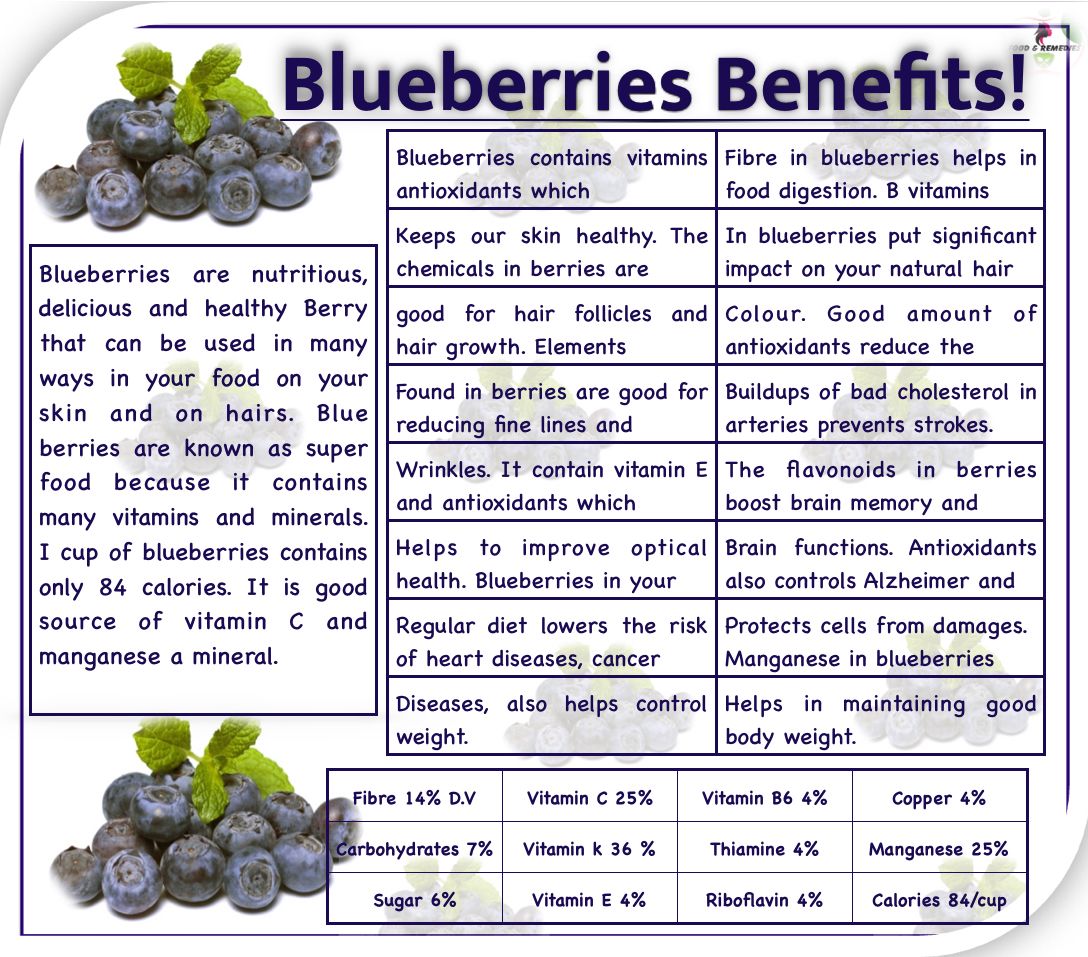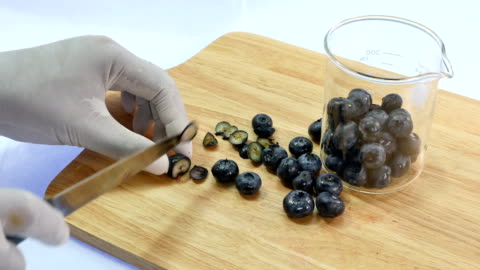Can Budgies Eat Blueberries? A Veterinarian's Opinion
Can budgies eat blueberries? Yes, budgies can eat blueberries in moderation as part of a healthy diet. Learn more from a veterinarian about the benefits and risks of feeding blueberries to your budgie.
Author:Maya ReyesReviewer:Sophia HarperOct 11, 202347K Shares1M Views

Can budgies eat blueberries? This is a common question that budgie owners ask. The answer is yes, budgies can eat blueberries in moderation as part of a healthy diet. Blueberries are a good source of vitamins, minerals, and antioxidants, which can be beneficial for budgies. However, it is important to feed blueberries safely, as they can also be a choking hazard and high in sugar.
Feeding blueberries to budgies is a topic that piques the curiosity of many bird enthusiasts and pet lovers. As responsible caregivers, we want to ensure that every morsel our feathered friends consume contributes positively to their well-being. In this comprehensive guide, we delve into the intriguing question: Can budgies eat blueberries? What sets this exploration apart is the authoritative perspective it offers – that of a seasoned veterinarian.
While it's natural to be drawn to the vibrant hue and enticing flavor of blueberries, understanding their suitability for budgies requires a nuanced approach. In this article, we'll navigate through the realms of avian nutrition, dissecting the benefits and potential risks associated with incorporating blueberries into your budgie's diet.
Drawing on the expertise of a qualified veterinarian, we aim to provide you with a well-informed, evidence-based perspective. This ensures that you can make dietary choices for your budgie that are not only enjoyable but also conducive to their overall health and vitality. So, let's embark on this insightful journey, learning how these tiny blue gems can play a part in your budgie's culinary repertoire.
veterinarians believe that blueberries can be a safe and healthy treat for budgies, as long as they are fed in moderation.
Understanding Budgie Nutrition
A balanced diet is essential for the health and well-being of budgies. In the wild, budgies eat a variety of seeds, grasses, fruits, and insects. However, in captivity, budgies have different dietary needs.
Importance Of A Balanced Diet
A balanced diet provides budgies with all the nutrients they need to stay healthy and active. It also helps to prevent health problems such as obesity, malnutrition, and vitamin deficiencies.
Key Components Of A Budgie's Diet
The main components of a budgie's diet are,
- Seeds -Seeds are a good source of energy and protein, but they should only make up about 50% of a budgie's diet. Feeding your budgie too many seeds can lead to weight gain and other health problems.
- Pellets -Pellets are a balanced food that contains all the nutrients budgies need. They are a good option to feed as the main part of a budgie's diet.
- Vegetables -Vegetables are a good source of vitamins, minerals, and antioxidants. Budgies should be offered a variety of vegetables each day, such as broccoli, carrots, spinach, and kale.
- Fruits -Fruits are a good source of vitamins and minerals, but they should only be fed to budgies in moderation. Too much fruit can lead to weight gain and other health problems. Blueberries are a good option to feed as a treat, as they are a good source of vitamins, minerals, and antioxidants.
Blueberries As A Potential Addition
Blueberries can be a healthy addition to a budgie's diet, as long as they are fed in moderation. Blueberries are a good source of vitamins C, K, and potassium, as well as antioxidants. However, it is important to note that blueberries are also high in sugar, so it is important to feed them in moderation.
Benefits Of Feeding Blueberries To Budgies
Blueberries, those tiny indigo orbs, pack a nutritional punch that can greatly benefit your budgie's health and well-being. Here are some key advantages of including blueberries in your budgie's diet,
Rich Source Of Essential Vitamins And Minerals
Blueberries are a treasure trove of essential nutrients. They are particularly rich in vitamin C, a vital nutrient that supports the immune system and aids in the absorption of other nutrients. Additionally, blueberries provide a healthy dose of vitamin K, crucial for proper blood clotting, and potassium, which helps regulate blood pressure and maintain heart health.
Abundance Of Antioxidants
These little blue gems are antioxidant powerhouses. Antioxidants play a critical role in neutralizing harmful free radicals in the body. For budgies, this means added protection against cellular damage, ultimately contributing to a longer, healthier life. The antioxidants found in blueberries can help bolster your budgie's overall health and longevity.
Variety In The Diet
A diverse diet is essential for any budgie's well-being. By introducing blueberries, you're not only providing a nutrient-dense treat but also adding a delightful burst of flavor and texture to their meals. This variety can stave off dietary monotony and keep your budgie engaged and interested in their food.
Mental Stimulation And Boredom Prevention
Believe it or not, budgies enjoy a bit of culinary excitement! Blueberries, with their unique texture and taste, can be a delightful addition to their daily routine. Offering different foods, like blueberries, encourages mental stimulation and helps prevent boredom. It's a small step towards ensuring your budgie's overall mental and emotional well-being.
Supports Overall Health And Vitality
When included as part of a balanced diet, blueberries can contribute to your budgie's overall health and vitality. The combination of vitamins, minerals, and antioxidants can boost their immune system, promote healthy digestion, and provide sustained energy levels.
Blueberries are a nutritious and delicious treat that can be enjoyed by both humans and budgies alike. Here are some of the benefits of feeding blueberries to budgies,
- Vitamin C -Blueberries are a good source of vitamin C, which is essential for budgie health. Vitamin C helps to boost the immune system, prevent cell damage, and promote wound healing.
- Vitamin K -Blueberries are also a good source of vitamin K, which is important for blood clotting and bone health.
- Potassium -Potassium is an essential mineral that helps to regulate blood pressure and fluid balance. Blueberries are a good source of potassium, which can be beneficial for budgies with heart problems or other health conditions.
- Antioxidants -Blueberries are high in antioxidants, which can help to protect budgies from cell damage caused by free radicals. Free radicals are unstable molecules that can damage cells and contribute to aging and disease.
- Variety -Blueberries can be a good way to add variety to a budgie's diet. Budgies can become bored with eating the same thing day in and day out, so offering them a variety of fresh fruits and vegetables can help to keep them healthy and happy.
In addition to the benefits listed above, blueberries are also a low-calorie and fat-free snack. This makes them a good option for budgies who are overweight or have other health conditions.
Risks Of Feeding Blueberries To Budgies
While blueberries offer a range of health benefits for budgies, it's essential to be aware of potential risks associated with their consumption. Here are some important considerations,
High Sugar Content
Blueberries, though nutritious, are naturally high in sugar. While this natural sugar is generally considered safe, it's crucial to remember that moderation is key. Excessive sugar intake can lead to weight gain and related health issues in budgies. Obesity, in particular, can have serious consequences for their overall well-being, potentially leading to cardiovascular problems and reduced mobility.
Choking Hazard
The size and texture of whole blueberries can pose a choking hazard for budgies. These small birds may have difficulty manipulating and swallowing the berries in their entirety. To mitigate this risk, it's recommended to cut the blueberries into smaller, manageable pieces before offering them to your budgie. This precaution ensures that they can enjoy the benefits of blueberries without the potential danger of choking.
Potential Allergies
As with any new food introduced to a budgie's diet, there's a possibility of individual sensitivity or allergies. While relatively rare, some budgies may exhibit allergic reactions to blueberries. Keep a close watch on your budgie after the initial introduction of blueberries, looking for signs of discomfort, unusual behavior, or allergic symptoms. If any such signs are observed, consult a veterinarian promptly.
Balancing The Diet
It's important to remember that while blueberries can be a nutritious addition, they should not overshadow the core components of your budgie's diet. A balanced diet for budgies includes a variety of foods, including seeds, pellets, fresh vegetables, and occasional treats like blueberries. Striking this balance ensures that your budgie receives a well-rounded nutritional profile.
Consulting A Veterinarian
Before making any significant changes to your budgie's diet, especially when introducing new foods like blueberries, it's advisable to consult with a veterinarian. They can provide personalized recommendations based on your budgie's specific health needs, helping you make informed choices that support their overall well-being.
Other Risks
In addition to the risks listed above, there are a few other things to keep in mind when feeding blueberries to budgies,
- Pesticides -Blueberries may be treated with pesticides, so it is important to wash them thoroughly before feeding them to your budgie.
- Spoilage -Blueberries can spoil quickly, so it is important to remove any uneaten blueberries from your budgie's cage after a few hours.
- Diarrhea -Eating too many blueberries can cause diarrhea in budgies. If your budgie experiences diarrhea after eating blueberries, stop feeding them blueberries and consult with your veterinarian.
Minimize The Risks
To minimize the risks associated with feeding blueberries to budgies, follow these tips,
- Feed blueberries in moderation.
- Cut blueberries into smaller pieces before feeding them to your budgie.
- Wash blueberries thoroughly before feeding them to your budgie.
- Remove any uneaten blueberries from your budgie's cage after a few hours.
- Monitor your budgie for any signs of illness, such as diarrhea, after feeding them blueberries. If you notice any signs of illness, stop feeding your budgie blueberries and consult with your veterinarian.
Overall, blueberries are a safe and healthy treat for budgies, as long as they are fed in moderation and cut into smaller pieces.
Feed Blueberries To Budgies Safely
Feeding blueberries to your budgie can be a delightful addition to their diet, but it's important to do so in a manner that ensures their safety and enjoyment. Here's a step-by-step guide on how to feed blueberries to budgies safely,
Thoroughly Wash The Blueberries
Before offering blueberries to your budgie, it's crucial to wash them thoroughly. This helps remove any residual pesticides, dirt, or contaminants that may be present on the surface of the berries. Rinse them under cool, running water and gently pat them dry with a clean cloth.
Remove Stems And Leaves
Inspect each blueberry and ensure that all stems and leaves are completely removed. These parts can be potential choking hazards and should be discarded before feeding the berries to your budgie.
Cut Blueberries Into Smaller Pieces
While budgies are adept at handling small fruits, blueberries can still pose a choking risk due to their size. To mitigate this, carefully cut the blueberries into smaller, bite-sized pieces. This ensures that your budgie can comfortably handle and consume them without any difficulty.
Offer As A Treat Or Snack
Blueberries should be presented as an occasional treat or snack, in addition to your budgie's regular diet. They should not replace the primary components of their diet, such as pellets, seeds, and fresh vegetables.
Monitor Consumption
After offering blueberries, keep a close eye on your budgie to observe how they interact with the fruit. Ensure they are eating the blueberries comfortably and without any signs of distress.
Remove Uneaten Blueberries
To prevent spoilage and maintain cleanliness in the cage, remove any uneaten blueberries after a few hours. This helps avoid potential bacterial growth on leftover fruit.
Moderation Is Key
While blueberries offer valuable nutrients, it's important not to overdo it. Offering them a few times per week is sufficient. Remember, moderation is crucial in maintaining a balanced and healthy diet for your budgie.
Here are some additional tips,
- You can offer blueberries to your budgie fresh or frozen. If you are offering frozen blueberries, be sure to thaw them completely before feeding them to your pet.
- You can also offer blueberries to your budgie in a variety of ways. You can place them on a dish in your budgie's cage, or you can hand-feed them to your pet.
- If your budgie is hesitant to try blueberries at first, you can try mixing them with other fruits and vegetables that they already like.
- If you have any concerns about feeding blueberries to your budgie, be sure to consult with your veterinarian.
By following these steps, you can provide your budgie with the benefits of blueberries while minimizing potential risks. This approach ensures that your feathered friend can enjoy this tasty and nutritious treat safely and in moderation.
(Can Budgies Eat Blueberries) _____ FAQs
Is Blueberry Safe For Birds?
Any type of berry that is safe for human consumption, such as strawberries, blueberries, and raspberries, are also safe for your pet birds to snack on. 1 As you might imagine, this can open your pet bird up to a whole new world of flavor combinations and variety.
What Naturally Eats Blueberry?
Grouse, turkey, mourning doves, thrushes, bluebirds, and scarlet tanger birds all eat the berries. Even young whooping cranes feed on lowbush blueberries. Black bears, foxes, deer, rabbits, skunks, fox squirrels, and chipmunks will eat the fruits as well as the twigs and leaves.
Is Blueberry A Brain Food?
Long considered as a kind of “superfood”, blueberries equal brain health. Their brain-boosting power comes from their high concentration of antioxidants, which help to balance the number of free radicals in the body to counteract oxidative stress and support a healthy, well-functioning immune system.
Conclusion
Yes, budgies can eat blueberries in moderation as part of a healthy diet. Blueberries are a good source of vitamins, minerals, and antioxidants, which can be beneficial for budgies. However, it is important to feed blueberries safely, as they can also be a choking hazard and high in sugar.
Veterinarians generally recommend feeding blueberries to budgies in moderation as part of a healthy diet. Blueberries are a good source of vitamins, minerals, and antioxidants, which can help to boost budgies' immune systems and improve their overall health. However, veterinarians also advise budgie owners to be aware of the potential risks of feeding blueberries to budgies, such as choking and weight gain.
Veterinarians also recommend cutting blueberries into smaller pieces before feeding them to budgies. This will help to prevent choking. Additionally, veterinarians advise budgie owners to remove any uneaten blueberries after a few hours, as they can spoil and become a breeding ground for bacteria.
Overall, veterinarians believe that blueberries can be a safe and healthy treat for budgies, as long as they are fed in moderation.

Maya Reyes
Author
Maya Reyes’s wanderlust was sparked in the temples of Luang Prabang, where the scent of lemongrass and the chants of monks revealed the transformative power of travel.
Since then, her journey has been defined by cultural immersion and authentic connections. From learning batik in Indonesia to sharing meals with nomadic families in Mongolia, Maya seeks experiences that highlight the human stories behind each destination.
Travel for her is a way to weave her narrative into the world’s cultural tapestry, creating bridges across diverse ways of life. Maya has traveled to 15 countries and shares her insights through writing and storytelling.

Sophia Harper
Reviewer
Sophia Harper’s photography acts as a portal to the soul of the places she visits. Drawn to South America’s landscapes and cultures, she has spent years capturing everything from the majesty of ancient ruins to the vibrancy of urban streets.
Sophia’s work isn’t just about documenting moments; it’s about evoking the emotions and stories behind them. A dedicated photographer, she has worked with local communities across South America to capture their rich cultural narratives through her lens.
Latest Articles
Popular Articles

